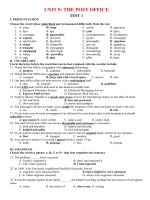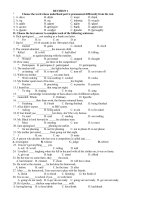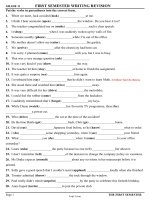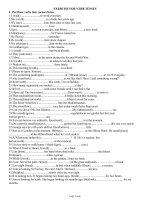Ôn tập môn Tiếng Anh 11 - Gerund and to - Infinitive
Bạn đang xem bản rút gọn của tài liệu. Xem và tải ngay bản đầy đủ của tài liệu tại đây (120.85 KB, 4 trang )
<span class='text_page_counter'>(1)</span>Class 10. GERUND AND TO-INFINITIVE I)GERUND : là những động từ thêm -Ing * Những động từ theo sau bởi GERUND: admit (thừa nhận) practice(thực hành) avoid (tránh) give up(bỏ) appreciate (đánh giá cao) hate (ghét) consider (cho là ,xem là) imagine (tưởng tượng ) deny (phủ nhận) mention (đề cập ,nói đến) detest (ghét) mind (phản đối,phiền) delay (trì hoãn) miss (nhớ) dislike (ghét) postpone (trì hoãn) escape (trốn thoát) prefer (thích hơn) enjoy (thưởng thức) prevent(ngăn) finish (hoàn thành) recall (gợi lại,nhớ lại) * Những thành ngữ với”go+V-ing”:. recollect (hồi tưởng lại) regret (hối tiếc ,ân hận) resist (chịu đựng được) suggest (đề nghị) support (ủng hộ). Go camping (đi cắm trại) go shopping(đi mua sắm) go swimming Go dancing (đi khiêu vũ) go fishing (đi câu cá) *Preposition+gerund(giới từ +gerund): Interested in (thích thú) think about (nghĩ về) apolosize for(xin lỗi về) Insist on (khăng khăng về) talk about (nói về) instea of (thay vì) * Những thành ngữ với gerund (expressions+gerund): -can’t help -can’t bear, can’t stand (không thể chịu được) -it is no good, it is no use (vô ích) -there is no (không còn cách) -would you mind? (xin ông làm ơn) -do you mind(ông có phiền không) -have trouble(lo lắng, phiền muộn) *Adjectives +gerund: Busy (bận rộn) Worth (đáng ,xứng đáng). II)TO-INFINITIVE *Những động từ theo sau bởi TO-INFINITIVE: Decide (quyết định) ;hope(hi vọng); want; agree(đồng ý) ; plan (dự định);demand(yêu cầu)… Ex:We hope to see you soon. *Verb +O +To-infinitive: Want ; ask(hỏi , nhờ) ;advise(khuyên) ;tell; request(yêu cầu); order(ra lệnh). Ex: She advises me to leave here early. MỘT SỐ ĐỘNG TƯ THEO SAU BỞI TO-INFINITIVE VÀ GERUND ĐỀU ĐƯỢC (tùy theo nghĩa của nó): +Regret/Remember/Forgot Gerrund: chỉ hành động ở quá khứ Ex:I’ll never forget seeing him the first time Teacher –Lê Thị Mỹ Duyên Lop11.com.
<span class='text_page_counter'>(2)</span> Class 10. ( Tôi sẽ không bao giờ lần đầu tiên tôi đã gặp anh ta) Regret/Remember/ Forgot + To-infinitive: chỉ hành động ở tương lai Ex:Remember to invite her to the party. ( Hãy nhớ mời cô ta đến bữa tiệc ) +Stop/finish: Stop/finish +. Gerrund : ngừng làm việc gì Ex:I stop working for a moment (Tôi ngừng làm việc một lúc) To-infinitive:ngừng để làm việc khác Ex: I stop to eat. (Tôi ngừng để ăn). +Try: Gerrund: thử xem, thí nghiệm. Ex:He tried gardening ,keeping pigs,but didn’t succeed in any of them.(Anh ta thử làm vườn và nuôi heo, nhưng không thành công ) Try + To-infinitive:cố gắng Ex: I will try to help you. (Tôi cố gắng để giúp bạn) MỘT SỐ ĐỘNG TƯ CHỈ GIÁC QUAN: HEAR, SEE , FEEL(cảm thấy) ,NOTICE (nhận xét, để ý), WATCH,… -Dùng Infinitive(khôngTo) khi muốn chú ý vào sự hoàn tất của hành động. Ex:I hear him come in.(Tôi nghe nói anh ta đã đi vào rồi.) -Dùng Gerund khi muốn chú ý sự tiếp diễn của hành động. Ex: I see the dog running across the street (Tôi thấy con chó đang chạy ngang qua đường) *NOTE: O+To -infinitive. Allow, permit Recommend + Advise. Gerund. Ex: The teacher permitted going out. The teacher permitted me to go out. O to-V CLASS: NAME:. A QUARTER TEST SUBJECT: ENGLISH. Teacher –Lê Thị Mỹ Duyên Lop11.com.
<span class='text_page_counter'>(3)</span> Class 10. Choose a, b, c or d that best completes each unfinished sentence; or that best substitutes the under line part. 1. The fire alarm went off when smoke rose. a. exploded b. shouted c.rang d. burned 2. During his break , Mr.Pike is used to drink tea with his fellow peasants. a. workers b. associates c. mechanics d. farmers 3. Lightning rarely twice in the same place. a. Strikes b. is striking c. will strike d. was striking. 4. Two tons of rice to the victims of the flood yesterday. a. Sent b. were sent c. was sent d. has been sent 5. Bill put his money in a bank, ? a. isn’t he b. doesn’t he c. didn’t he d. does he 6. He very busy at the present .He free time to go out. a. is often /rarely has c. often was /had rarely b. has often been / has rarely d. often is / rarely has 7. He his leg when he last year. Up to now, he any more. a. breaks /was skiing /is not skiing c. broken / skied / has no skied b. broke / was skiing / has not skied d. had broken / skied / does not ski 8. The meeting is 9 o’clock Monday. a. in / at b. on / in c. for / on d. at / on 9. He finished his work at five and got home at quarter past five. a. five b. fifteen c. half d. forty-five 10. Mr. Jone often to work by car every day but today he by bus. a. goes / goes b. is going / will go c. went / has gone d. goes / is going 11. He twenty calves last week , now he them up to sell. a. had bought / fed c. buys / feeds b. bought / is feeding d. was buying / fed 12. At the moment, we with the council for the sale of development land. a. have negotiated b. negotiate c. were negotiating d. are negotiating 13. You used to live on the farm during your childhood , ? a. weren’t you b. didn’t you c. don’t you d. aren’t you 14. on Sundays a. Always he gets up late b. He always gets up c. Does he get up always late d. He gets always up 15. My car is hers a. Cheaper and more convenient than b. more cheap and convenient than c. more cheaper and convenient as d. as cheap and more convenient than. Teacher –Lê Thị Mỹ Duyên Lop11.com.
<span class='text_page_counter'>(4)</span> Class 10. Teacher –Lê Thị Mỹ Duyên Lop11.com.
<span class='text_page_counter'>(5)</span>









